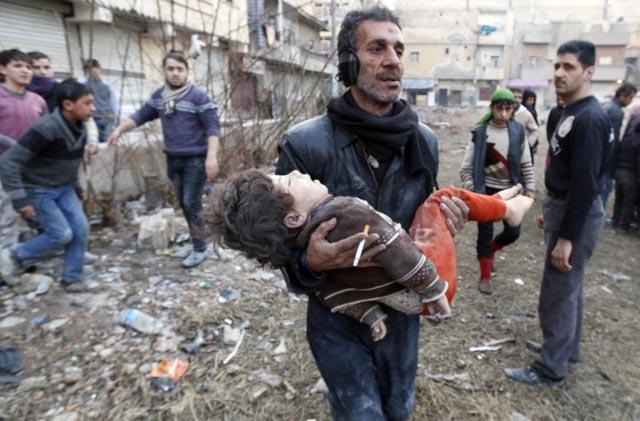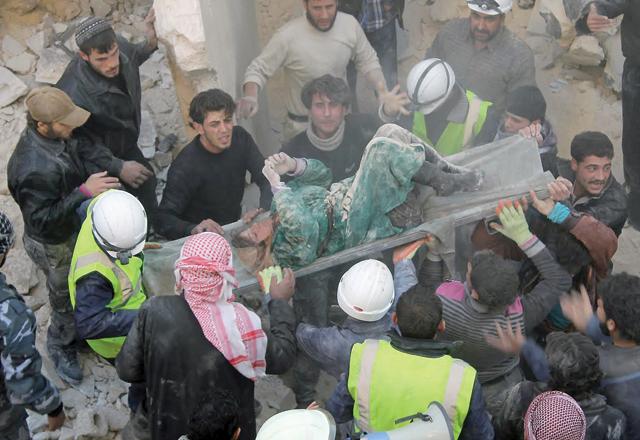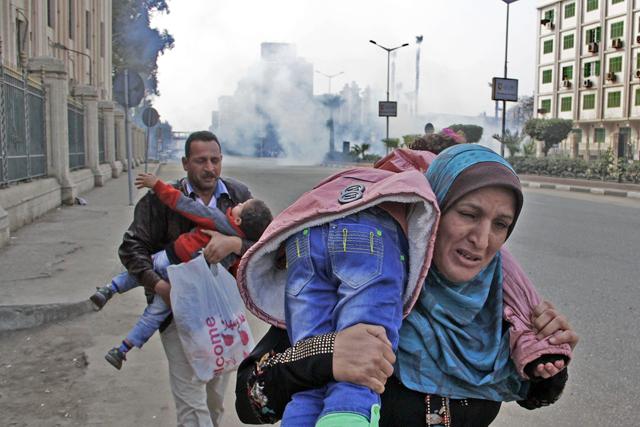Western leaders have hailed a decision by Syria’s opposition to attend an international peace conference on Wednesday alongside representatives of a regime they despise and remain determined to overthrow, Agence France-Presse reported.
After weeks of hesitation and threats to boycott the talks, the deeply divided National Coalition said it will go to Switzerland, with the sole aim of toppling President Bashar Assad.
The so-called Geneva II meeting aims to set up a transitional government to end a brutal war estimated to have killed more than 130,000 people and forced millions from their homes in nearly three years.
US Secretary of State John Kerry hailed the opposition’s “courageous” decision to attend the talks, describing it as a “path that will ultimately lead to a better future for all Syrians”.
“We all know that the process ahead will be difficult, but I say directly to the Syrian people: We will stand by you every mile of the journey as you seek to achieve the freedom and dignity that all Syrians deserve,” he said in remarks echoed by Britain, France and Germany.
Russia, too, hailed the announcement.
“That is the right decision, we have always said that one has to go to the forum and enter into dialogue with the government,” Deputy Foreign Minister Mikhail Bogdanov told the state ITAR-TASS news agency.
“The work of the conference will be based on this, the main thing is the launch of inter-Syrian talks,” said Bogdanov.
The coalition voted Saturday by 58 to 14 to attend the peace conference in the Swiss town of Montreux, with only 75 of the around 120 delegates taking part in the secret ballot — a sign that strong disagreement persists.
Coalition leader Ahmad Jarba said the group was going to Switzerland to remove the “butcher” Assad from power.
“The Geneva II negotiation table is a one-way road aimed at achieving all the demands of the revolution... and first and foremost stripping the butcher [Assad] of all his powers,” he said.
The head of the rebel Free Syrian Army, General Salim Idriss, called for a “peaceful resolution” to the conflict, and urged the opposition to uphold the “goals of the revolution” and remove Assad and his allies from power.
The FSA, the armed wing of the Coalition has been greatly marginalised by the emergence of Al Qaeda-linked jihadists and Islamist rebel brigades.
Coalition member Munzer Aqbiq said the opposition would form within 24 hours a delegation made up of diplomats, politicians, FSA representatives and legal experts.
The coalition has been under intense pressure from its Western and Arab backers to attend the talks.
UN chief Ban Ki-moon on Sunday hailed the opposition’s decision as a boost to efforts to halt the Syrian war.
“I look forward to the opposition’s expedited formation of a delegation that broadly represents the diversity of the Syrian opposition, including women,” added the UN Secretary General, who is the convenor of the conference.
The regime has said it will send a high-level delegation, and has offered concessions ahead of the talks, including a prisoner swap and a security plan for the battered northern city of Aleppo.
Foreign Minister Walid Muallem said Damascus was determined to ensure the talks were a success, and sent a letter to the United Nations saying the conference is about tackling extremists.
Kerry dismissed the concessions, saying “nobody is going to be fooled”.
“They can bluster, they can protest, they can put out distortions, the bottom line is we are going to Geneva to implement Geneva I, and if Assad doesn’t do that he will invite greater response,” he said.
More than 35 countries will gather in the Swiss cities of Montreux and Geneva from Wednesday for the peace talks, as reports from Syria spoke of more bloodletting and infighting among rebels.
Also Sunday, dozens of critically ill residents of a besieged Palestinian refugee camp south of Damascus were evacuated, a Palestinian official told AFP.
The Yarmouk camp has been largely under the control of Syrian opposition forces for months and government forces have imposed a siege and choked off the entry of supplies into the camp since September.
Palestine Liberation Organisation official Anwar Abdul Hadi said the evacuations would continue daily until 600 residents in a critical condition had left Yarmouk.
‘Giving up power’
Syrian state media dismissed as “not accurate” a report by news agency Interfax that Assad told visiting Russian parliamentarians he has no intention of giving up power and the issue is not up for discussion, according to Reuters.
Assad was quoted as telling the visitors days ahead of an internationally sponsored peace conference on Syria that “if we wanted to give up, we would have done so at the very beginning. We are on guard for our country. This issue is not up for discussion.”
Syrian state television said that the Assad quotes on Interfax “are not accurate”. It also said Assad “did not conduct an interview with the agency”, although Interfax had not said that it had.
The comments attributed to Assad underscore differences between participants ahead of the January 22 talks in Montreux, Switzerland, seen as the most serious global effort yet to end Syria’s three-year conflict, during which Assad has enjoyed Russia’s protection.
Syria’s main political opposition group in exile agreed on Saturday to attend the talks, dubbed “Geneva 2”, and said that three rebel groups supported the move.
But the fractured National Coalition itself has little influence on the ground in Syria and other major opposition fighter units have rejected its authority and peace talks.
The United Nations hopes the talks will bring about a political transition in the country, and US Secretary of State John Kerry said last week that Syria’s future had no place for Assad.
Syria, however, said in a letter to UN Secretary-General Ban Ki-moon last week that its focus at the peace conference would be on fighting “terrorism”.
Alexander Yushchenko, parliamentarian and member of the delegation to Syria, was quoted in Itar-Tass, another Russian news agency, as saying Assad “suggested that his opponents announce their candidacy and run against him for the votes of the people... but so far however, no one has done it.”



















